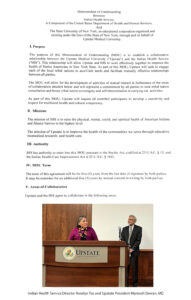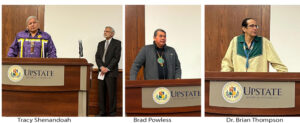Syracuse.com
By Douglass Dowty
Syracuse, NY — State and federal officials on Tuesday signed an agreement that promises to bring more medical providers, research and recruitment efforts to the Onondaga Nation. A state-run medical clinic on the Nation will get a boost with a new full-time nurse practitioner and nurse manager positions, paid for by the federal Indian Health Service, said the health clinic’s medical director, Dr. Eva Gregory.
That will bolster a staff of about 20 that has, in recent years, been given a $1.6 million lifeline that has to be re-approved each year by the governor’s office, Gregory said.
Until now, the only consistent funding for the medical center has been a $1.3 million annual commitment from the state legislature. That led to chronic understaffing and long waits for Nation residents to receive care.
The federal money will provide another predictable revenue stream, Gregory said. The clinic also receives funding for three dentists.
About 2,000 Onondaga Nation residents are eligible to receive free care at the clinic. It sees about 10,000 patient visits a year.
Renovations are underway for the first time to the 1997 building on Route 11A, with plans to increase mental health services in coming months, Gregory said. Salaries, which had been far below market rates, have improved to retain staff.
The clinic’s viability is one facet of the memorandum of understanding signed Tuesday between the state’s Upstate Medical University, which runs the clinic, and the federal Indian Health Service, which is responsible for overseeing medical services on tribal lands.
Upstate also pledged to offer more health services on the Nation, including new programs to combat diabetes, and increase recruitment efforts to bring more Nation residents into the healthcare field. This year, it started a program that provides a four-year, $250,000 scholarship for Onondaga Nation residents to attend medical school.
Researchers will also begin studying why Nation residents have the highest premature death rate in the area, as well as a host of other chronic health challenges.
 Upstate’s efforts extend to all indigenous peoples across the state, though it’s primary focus will be on the Onondaga Nation, only miles away from campus.
Upstate’s efforts extend to all indigenous peoples across the state, though it’s primary focus will be on the Onondaga Nation, only miles away from campus.
Onondaga Nation Council Member Brad Powless noted that such investments have been promised since a treaty signed in the 1700s.
“We continue to remind our brother government in the United States that we need to be promoting the health of the Haudenosaunee,” Powless said.
Upstate President Dr. Mantosh Dewan began the ceremony Tuesday by saying that not enough has been done.
“It is important to acknowledge this painful history,” Dewan said. “But it is even more important to act.”
Upstate OB-GYN Dr. Brian Thompson, an Oneida, noted the Onondagas’ commitment to human and environmental rights, as well as the insistence that the Nation be treated as “brother-to-brother” with the U.S.
Before now, the federal Indian Health Service has primarily paid for inpatient hospital stays for Nation residents. The state has paid for outpatient services.
Indian Health Service director Roselyn Tso, a Navajo, drove through the night from New York City to attend Tuesday’s event in Syracuse after missing her connecting flight from the Washington D.C. area.
It’s Tso’s third visit to the ancestral lands of the Onondagas in her 27 months as director of the $8 billion federal agency.
